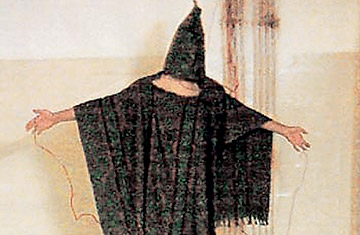
A hooded Iraqi prisoner in Abu Ghraib prison near Baghdad
Congress and the President have broad powers to find and fix what ails government. Congress has oversight and investigative authority granted implicitly by the Constitution and explicitly by statute. Pretty much every agency in the executive branch, even top-secret ones, has an inspector general charged with rooting out fraud, waste and abuse. And whole organizations exist to pursue and expose noncriminal bad behavior in government.
Too bad all these tools often suffer from the same problems as the organizations they're supposed to fix: partisanship, indifference and incompetence.
When one party is in control of both the White House and one or both chambers of Congress, the Hill often overlooks oversight of the executive branch. For example, says American Enterprise Institute scholar Norm Ornstein, during the period of GOP dominance under George W. Bush, homeland-security oversight failed. "The failure to do any oversight of the Homeland Security Department helped lead to the failure of Katrina," Ornstein says.
Divided government often doesn't fare much better. Ornstein points out that Republicans during the Clinton presidency held "hundreds of hours of hearings about how the White House abused the Christmas-card list for fundraising," while under Bush they spent eight hours investigating the abuses at Abu Ghraib, he says.
Partisanship can stall investigations as easily as it can generate them. After the Bush Administration incorrectly declared that Saddam Hussein had dangerous weapons of mass destruction in the run-up to the 2003 war in Iraq, Congress launched a three-phase investigation into the intelligence screwup. But Republicans accused Democrats of going on a politically motivated witch hunt, and Democrats said Republicans were complicit in a cover-up of Administration mishandling of intelligence. It took years to get through the first two phases of the investigation. By the time the third got under way, few were paying attention anymore and the conclusions were watered down by committee.
Congress does little better — and probably worse — at overseeing itself. Democrats promised to overhaul ethics oversight in Congress, but failed to deliver. Barack Obama's chief of staff, Rahm Emanuel, championed limits on lobbying by family members of members of Congress when Democrats were out of power in 2005, but once they took over in 2007 the promised restrictions never materialized.
The executive branch is less susceptible to partisanship since it's run by one party at a time. Created in 1978, inspectors general have broken some of the biggest stories in recent years. Bush-era inspector general Earl Devaney exposed unethical behavior by lobbyist Jack Abramoff and forced out then Deputy Secretary of the Interior J. Steven Griles for obstructing his investigation. But IGs are not immune to accusations of partisan influence. Janet Rehnquist, the daughter of the late Supreme Court Justice William Rehnquist, was accused of partisan motivation when she delayed a Florida pension-fund audit at the request of Governor Jeb Bush's chief of staff.
As a rule, government investigation and oversight works best when members of both parties agree that institutional responsibility trumps party loyalty. Ornstein cites the period under Bush when Henry Waxman of California and Tom Davis of Virginia led the House Committee on Oversight and Government Reform.
More often, Congress is where investigations go to die.
